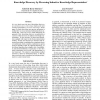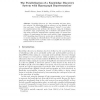290 search results - page 4 / 58 » Representation and Distribution of Geospatial Knowledge |
KR
2004
Springer
14 years 1 months ago
2004
Springer
In a very basic sense, the aim of knowledge discovery is to reveal structures of knowledge which can be seen as being represented by structural relationships. In this paper, we ma...
IAT
2007
IEEE
14 years 1 months ago
2007
IEEE
Networks of sensors and simulation models of the physical environment have been implemented separately, often using agent-based methodologies. Some work has been done in providing...
CSDA
2006
13 years 7 months ago
2006
This article deals with the compact representation of incomplete probabilistic knowledge which can be encountered in risk evaluation problems, for instance in environmental studie...
IPPS
2000
IEEE
14 years 11 hour ago
2000
IEEE
Abstract. Knowledge discovery is a time-consuming and space intensive endeavor. By distributing such an endeavor, we can diminish both time and space. System INDED
pronounced indee...
COSIT
2005
Springer
14 years 1 months ago
2005
Springer
How can the usability of distributed and heterogeneous geographic data sets be enhanced? Semantic interoperability is a prerequisite for effectively finding and accessing relevant ...


